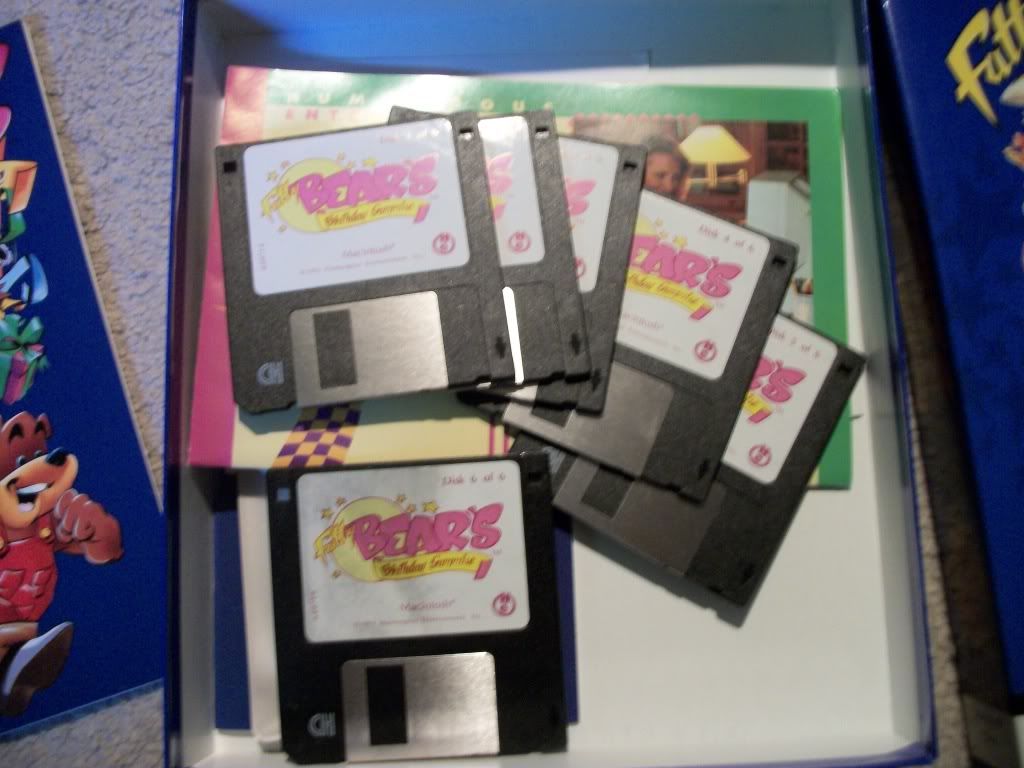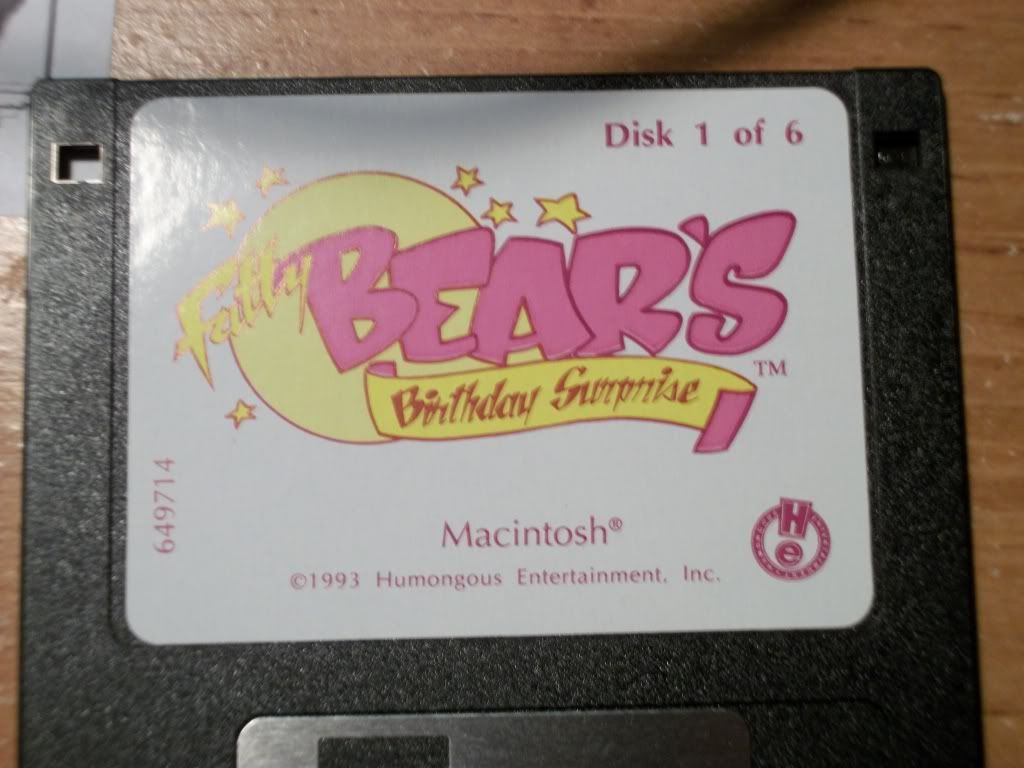Humongous Entertainment Macintosh Floppy Games
Moderator: ScummVM Team
Humongous Entertainment Macintosh Floppy Games
I noticed that there is no information on the data files page for what is required from the floppy disc versions of the older Humongous games. Are these games not supported?
Re: Humongous Entertainment Macintosh Floppy Games
Er... I've never heard of any floppy versions of Humongous games. I'm quite certain they were only ever released on CD, but feel free to prove me wrong.Retrodude wrote:I noticed that there is no information on the data files page for what is required from the floppy disc versions of the older Humongous games. Are these games not supported?


Sorry, but you're wrong. I believe that these are from the very first releases in the 1992-93 era. I got these from Amazon.com, and it still had what I'm assuming is its original shrink-wrap on it. I also have the coinciding merchandise packed in with the game, such as Junior Adventurer's Handbook, mail-in slip for their newsletter, and a promotional insert detailing their other products. Also, on the side of the box it says that it was released in both High Density Disk and CD-ROM editions.
Anyways, I think I might have a gem on my hands. Speaking to clone, if you need any further information, we can discuss this through PMs if needed.
Wasn't the first time and certainly won't be the lastRetrodude wrote:Sorry, but you're wrong.
Yes, this would be a rarity, I think. Do you have the capability of dumping the disks? What files are on there? Is the game detected?Retrodude wrote:I believe that these are from the very first releases in the 1992-93 era. I got these from Amazon.com, and it still had what I'm assuming is its original shrink-wrap on it. I also have the coinciding merchandise packed in with the game, such as Junior Adventurer's Handbook, mail-in slip for their newsletter, and a promotional insert detailing their other products. Also, on the side of the box it says that it was released in both High Density Disk and CD-ROM editions.
Anyways, I think I might have a gem on my hands. Speaking to clone, if you need any further information, we can discuss this through PMs if needed.
I haven't yet examined the files. To be honest I'm not sure if my system will detect the disks since I'm running windows XP, a far cry from Macintosh for sure, but I'll definitely give a go at it. I'll update this post when I get more information.clone2727 wrote:Wasn't the first time and certainly won't be the lastRetrodude wrote:Sorry, but you're wrong.
Yes, this would be a rarity, I think. Do you have the capability of dumping the disks? What files are on there? Is the game detected?Retrodude wrote:I believe that these are from the very first releases in the 1992-93 era. I got these from Amazon.com, and it still had what I'm assuming is its original shrink-wrap on it. I also have the coinciding merchandise packed in with the game, such as Junior Adventurer's Handbook, mail-in slip for their newsletter, and a promotional insert detailing their other products. Also, on the side of the box it says that it was released in both High Density Disk and CD-ROM editions.
Anyways, I think I might have a gem on my hands. Speaking to clone, if you need any further information, we can discuss this through PMs if needed.
Update: After examining the floppies with a free trial of TransMac, the disks all contain a single folder named "Fatty Bear Disk #" with the # representing the disk number (1-6) and each folder contains a single file called "Fatty Bear.sea", and furthermore, every disk number higher than one adds an extra ".#" to the end, again with # representing the disk number. I'll attempt an extraction and see if ScummVM detects the games.
Update 2: I'll give the software below a try, it will probably work better than TransMac anyways.
Last edited by Retrodude on Wed May 18, 2011 8:49 pm, edited 2 times in total.
You need to use HFVExplorer. See here.Retrodude wrote:I haven't yet examined the files. To be honest I'm not sure if my system will detect the disks since I'm running windows XP, a far cry from Macintosh for sure, but I'll definitely give a go at it. I'll update this post when I get more information.
I'm extracting the files as I type this. The HPVExplorer program is working great for being semi-outdated. Just as a small note, you might want to update the link to the download on the wiki since the links to the download on that page are broken. I was able to get it through a quick google search, though, so there are still places with the program.
Also, I'm speculating as to the interesting (to me) naming of the datafiles. Could the numbered file extensions be the equivalent to the .he# extensions used in later cd-rom games?
Also, I'm speculating as to the interesting (to me) naming of the datafiles. Could the numbered file extensions be the equivalent to the .he# extensions used in later cd-rom games?
They are MacOS 9 self extracting archives (thus the sea extension). Stuffit used to be able to create those, so maybe Stuffit Expander can extract them (it is free and I think there is a Windows version nowadays).Retrodude wrote:... and each folder contains a single file called "Fatty Bear.sea", and furthermore, every disk number higher than one adds an extra ".#" to the end, again with # representing the disk number. I'll attempt an extraction and see if ScummVM detects the games.
I guess the # extensions for all the files except the first one is because it is a segmented archive (you start to extract it from the first disk and then it asks each other disks in turn to complete the extraction).
Thanks for the explanation. I doubt that the games were meant for MacOS 9, but I see what's going on here.criezy wrote:They are MacOS 9 self extracting archives (thus the sea extension). Stuffit used to be able to create those, so maybe Stuffit Expander can extract them (it is free and I think there is a Windows version nowadays).Retrodude wrote:... and each folder contains a single file called "Fatty Bear.sea", and furthermore, every disk number higher than one adds an extra ".#" to the end, again with # representing the disk number. I'll attempt an extraction and see if ScummVM detects the games.
I guess the # extensions for all the files except the first one is because it is a segmented archive (you start to extract it from the first disk and then it asks each other disks in turn to complete the extraction).
I've extracted the files from each game and I just attempted to add the games from ScummVM. I got the message I was expecting, "ScummVM could not find any game in the specified directory!" What should be my next move?
I used MacOS 9 as meaning older than MacOS X. Actually I used to create sea files on MacOS 7 with CompactPro in the early 90'. 
As I wrote you can try to use Stuffit Expander for Windows and see if it can extract the archive (place all the files in the same folder and try to extract the first one). There may be other utilities out there that are capable of extracting these archives. If it doesn't work, a possibility would be to use an old mac emulator (e.g. SheepShaver). Apple made MacOS 7.5 available as a free download and there may still be a link somewhere on their web site. Since they are self extracting archive, you would then just have to execute the sea file.
As I wrote you can try to use Stuffit Expander for Windows and see if it can extract the archive (place all the files in the same folder and try to extract the first one). There may be other utilities out there that are capable of extracting these archives. If it doesn't work, a possibility would be to use an old mac emulator (e.g. SheepShaver). Apple made MacOS 7.5 available as a free download and there may still be a link somewhere on their web site. Since they are self extracting archive, you would then just have to execute the sea file.
Ah, I see now. I'm not a regular Mac user so I'm not as knowledgeable about the language of Mac computers as others might be. For the record, I didn't know I was getting the Mac floppy version of the game in the first place. In fact the page I got it from said it was the CD-ROM version, but since the box was unopened the guy who sold it to me had no way of knowing it was the floppy version. So, just to clarify, does that mean that there is likely a set of files within the .sea files on the disks?criezy wrote:I used MacOS 9 as meaning older than MacOS X. Actually I used to create sea files on MacOS 7 with CompactPro in the early 90'.
As I wrote you can try to use Stuffit Expander for Windows and see if it can extract the archive (place all the files in the same folder and try to extract the first one). There may be other utilities out there that are capable of extracting these archives. If it doesn't work, a possibility would be to use an old mac emulator (e.g. SheepShaver). Apple made MacOS 7.5 available as a free download and there may still be a link somewhere on their web site. Since they are self extracting archive, you would then just have to execute the sea file.
Edit: The files seen on the disk using HFVExplorer is a few posts above. Also, nothing is displayed on the console.
Yes, basically sea files are like zip or rar files except that they are using a different compression algorithm and that they don't need a program to decompress them (when you are on an old mac that is) since the files include the program to decompress it (thus the self-extracting bit I mentionned).Retrodude wrote:So, just to clarify, does that mean that there is likely a set of files within the .sea files on the disks?
Sorry, missed the list. Yes, the files you need are probably in the .sea files.Retrodude wrote:Ah, I see now. I'm not a regular Mac user so I'm not as knowledgeable about the language of Mac computers as others might be. For the record, I didn't know I was getting the Mac floppy version of the game in the first place. In fact the page I got it from said it was the CD-ROM version, but since the box was unopened the guy who sold it to me had no way of knowing it was the floppy version. So, just to clarify, does that mean that there is likely a set of files within the .sea files on the disks?
Edit: The files seen on the disk using HFVExplorer is a few posts above. Also, nothing is displayed on the console.
I downloaded Stuffit Expander and tried opening the files to no avail. One odd thing I noticed is that the file from the first disk is recognized as a .bin file and the default program to open it is VLC Player of all things. I'm beginning to think that the files are too old to be extracted with the newer version of the program, but if there's a solution or an alternate program that can open the files, that might make things a bit easier.

